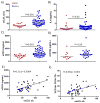Oxidized LDL Levels Are Increased in HIV Infection and May Drive Monocyte Activation
- PMID: 25647528
- PMCID: PMC4446174
- DOI: 10.1097/QAI.0000000000000566
Oxidized LDL Levels Are Increased in HIV Infection and May Drive Monocyte Activation
Abstract
Background: HIV infection is associated with increased cardiovascular risk, and this risk correlates with markers of monocyte activation. We have shown that HIV is associated with a prothrombotic monocyte phenotype, which can be partially mitigated by statin therapy. We therefore explored the relationship between oxidized low-density lipoprotein (oxLDL) particles and monocyte activation.
Methods: We performed phenotypic analysis of monocytes using flow cytometry on fresh whole blood in 54 patients with HIV and 24 controls without HIV. Plasma levels of oxLDL, soluble CD14, IL-6, and soluble CD163 were measured by enzyme-linked immunosorbent assay. In vitro experiments were performed using flow cytometry.
Results: Plasma levels of oxLDL were significantly increased in HIV infection compared with controls (60.1 units vs. 32.1 units, P < 0.001). Monocyte expression of the oxLDL receptors, CD36 and Toll-like receptor 4, was also increased in HIV. OxLDL levels correlated with markers of monocyte activation, including soluble CD14, tissue factor expression on inflammatory monocytes, and CD36. In vitro stimulation with oxLDL, but not to low-density lipoprotein, resulted in expansion of inflammatory monocytes and increased monocyte expression of tissue factor, recapitulating the monocyte profile we find in HIV disease.
Conclusions: OxLDL may contribute to monocyte activation, and further study in the context of HIV disease is warranted.
Conflict of interest statement
N.T.F. S.J. B.C. B.F. C.S. J.M. H.A.P-C performed experiments. B.R. and M.L. obtained patient samples. All authors contributed to experimental design, data analysis, and writing of the manuscript.
Dr McComsey has served as consultant, speaker, or received research grants from BMS, Pfizer, Merck, Gilead, and GSK Bristol-Myers Squibb, Pfizer, Merk, Gilead, and GlaxoSmithKline. All other authors declare no conflicts of interest.
Figures




References
-
- Baker JV, Huppler Hullsiek K, Bradford RL, Prosser R, Tracy RP, Key NS. Circulating Levels of Tissue Factor Microparticle Procoagulant Activity Are Reduced With Antiretroviral Therapy and Are Associated With Persistent Inflammation and Coagulation Activation Among HIV-Positive Patients. Journal of acquired immune deficiency syndromes (1999) 2013 Jul 1;63(3):367–371. - PMC - PubMed
Publication types
MeSH terms
Substances
Grants and funding
- 1K99HL108743-01/HL/NHLBI NIH HHS/United States
- KL2 TR000440/TR/NCATS NIH HHS/United States
- R00 HL108743/HL/NHLBI NIH HHS/United States
- R56HL126563/HL/NHLBI NIH HHS/United States
- AI-67039/AI/NIAID NIH HHS/United States
- R24 AI067039/AI/NIAID NIH HHS/United States
- AI-68636/AI/NIAID NIH HHS/United States
- U01 AI068636/AI/NIAID NIH HHS/United States
- R00HL108743/HL/NHLBI NIH HHS/United States
- AI-07164/AI/NIAID NIH HHS/United States
- R56 HL126563/HL/NHLBI NIH HHS/United States
- AI-36219/AI/NIAID NIH HHS/United States
- P30 AI036219/AI/NIAID NIH HHS/United States
- K99 HL108743/HL/NHLBI NIH HHS/United States
- UM1 AI068636/AI/NIAID NIH HHS/United States
- KL2TR000440/TR/NCATS NIH HHS/United States
LinkOut - more resources
Full Text Sources
Medical
Research Materials

